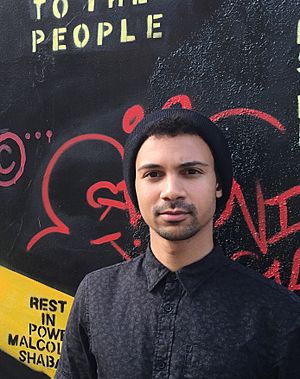Samuel Sinyangwe facts for kids
Quick facts for kids
Samuel Sinyangwe
|
|
|---|---|
 |
|
| Born | May 12, 1990 |
| Alma mater | Stanford University |
| Occupation | Policy analyst, activist |
| Era | 21st century |
| Organization | Mapping Police Violence |
Samuel Sinyangwe, born on May 12, 1990, is an American expert who studies how policies work. He is also an activist who works for fairness for all races. He is part of the Movement for Black Lives.
Sinyangwe created Mapping Police Violence. This is a collection of information about when police use deadly force in the United States. He also started the Police Scorecard. This website shares facts about how police use force and how they are held responsible. Sinyangwe also helped start We the Protestors. This group uses digital tools to support activism. One of these tools is Campaign Zero, which suggests ways to stop police violence. He also co-hosts the Pod Save the People podcast. On this podcast, he talks about the week's news with other activists.
Contents
Samuel Sinyangwe's Early Life
Samuel Sinyangwe was born on May 12, 1990. His father was from Tanzania, and his mother was European Jewish. They met while studying at Cornell University. Samuel grew up in College Park, a neighborhood in Orlando, Florida. He went to Winter Park High School and was part of the International Baccalaureate program.
Growing up in Florida, Samuel was often one of the few Black children among mostly white friends. This experience shaped his future work. In 2013, he was deeply affected by the trial of George Zimmerman. Zimmerman was found not guilty in the shooting death of Trayvon Martin. This happened in Sanford, Florida, a place where Samuel often went for soccer practice. He felt a strong connection to Trayvon's story. He realized he needed to focus his efforts on this important issue.
Sinyangwe later graduated from Stanford University. There, he studied how race connects with American politics, money, and social classes.
Samuel Sinyangwe's Career and Activism
Sinyangwe began his career at PolicyLink. He worked with the Promise Neighborhoods Institute. In 2014, protests started after the shooting of Michael Brown in Ferguson, Missouri. Samuel connected with activists from Ferguson online. He began working with DeRay Mckesson, Brittney Packnett, and Johnetta Elzie. Together, they looked for ways to solve problems related to police violence in America.
Using Data to Understand Police Actions
Samuel noticed that the government did not have official numbers on police violence. So, he started gathering this information himself. He used other sources like Fatal Encounters and KilledbythePolice.net. His goal was to show that police shootings were not rare events. He also wanted to challenge the idea that they only happened when people resisted arrest.
Creating Tools for Change
With other activists, Sinyangwe started We the Protestors. This group creates digital tools to help Black Lives Matter activism. Samuel built projects like Mapping Police Violence. This is a database of police killings. He also created Campaign Zero. This platform offers ideas for policies to end police violence.
Sinyangwe also works as a data scientist for OurStates.org. This project focuses on state laws. He also helped found the Resistance Manual with Mckesson and Brittney Packnett. This is an open-source project. It helps connect anti-racist activists with others working on similar issues. He has also made many requests for police data through the non-profit group MuckRock.
Influencing Policy and Media
During the 2016 U.S. Presidential campaign, Sinyangwe and his colleagues met with Democratic candidates. They talked about important policy issues with Bernie Sanders and Hillary Clinton. He has also spoken out against the "Ferguson Effect." This idea suggested that policing had decreased and crime had risen because activists were watching police actions closely. Samuel used data to show that this theory was not true.
Melissa Harris-Perry has compared Sinyangwe to Ida B. Wells. Wells was a journalist and activist who fought against lynching. Harris-Perry noted that Wells started her work by collecting data. She gathered social science and research about lynchings to help stop them.
Sinyangwe is a co-host of Mckesson's podcast, Pod Save the People. The podcast talks about the week's news with other activists. These include Mckesson, Packnett, and Clint Smith. The podcast focuses on race, community activism, and unfair treatment. GQ magazine recommended Pod Save The People. June Diane Raphael wrote that the podcast shares stories that make her wonder why she had not heard them before.
Samuel Sinyangwe has also appeared on CNN, MSNBC, and BBC News. He has been featured in FiveThirtyEight and The Los Angeles Times. He has also written for Huffington Post and The Guardian.
Awards and Recognition
In 2017, Samuel Sinyangwe was recognized by Forbes magazine. He was named to the Forbes 30 Under 30 list for law and policy. He also received an Echoing Green Black Male Achievement Fellowship in 2017.
Personal Life
Samuel Sinyangwe lives in New York City.
Selected Writings
- "Examining the Role of Use of Force Policies in Ending Police Violence", Police Use of Force Project, September 20, 2016.
 | James Van Der Zee |
 | Alma Thomas |
 | Ellis Wilson |
 | Margaret Taylor-Burroughs |

